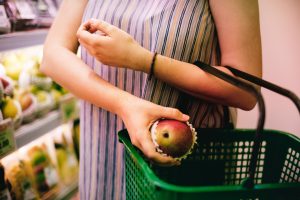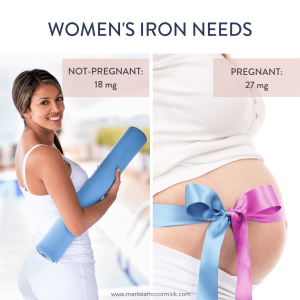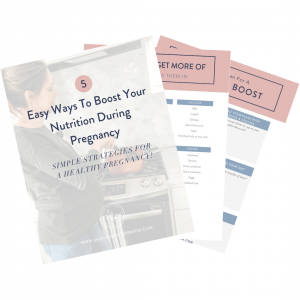During pregnancy you need 27 milligrams (mg) of iron each day, up from 18 mg for a non-pregnant women 19-50 years. This amount may be even higher for vegetarians. Work with your doctor and/or registered dietitian to figure out if you’re getting enough iron!
Am I iron deficient?
Unfortunately, iron deficiency anemia (meaning too little iron in your blood) is not uncommon, especially in pregnant women.
When levels of iron are low, fatigue, weakness and difficulty maintaining body temperature often result. Other symptoms may include:
- Shortness of breath
- Pale skin and fingernails
- Dizziness
- Headache
–> Anemic women run a greater risk of preterm delivery, and low birth weight.
Where can I get iron from?
You can find iron in both plant and animal foods. Most prenatal vitamins also contain iron.
There are two main forms of dietary iron: heme and non-heme iron. Animal foods like meat, seafood, and poultry contain both heme and non-heme iron. Plant-based foods like beans, fruits, vegetables, nuts, and some fortified cereals contain non-heme iron only.
Our bodies absorb the iron from animal-based protein (heme iron) better than the iron from plant-based protein (non-heme).

How can I improve my iron absorption?
As mentioned, non-heme iron is less bio-available (readily absorbed) than heme iron.
Vitamin C has been shown to help your body better absorb iron. Thus, it’s a good idea to eat iron-rich foods alongside foods with vitamin C to help increase iron absorption. For example, put orange slices on your spinach salad!
On the other hand, calcium (in dairy products like milk), polyphenols (in coffee/tea etc.), and phytates (in some grains & beans) can block your body from absorbing iron. It’s best to avoid drinking coffee/tea with iron rich foods, and wait at least half an hour before eating calcium-rich foods after eating iron-rich foods.
Sound complicated, right? It is. Which is why I recommend eating a well-balanced, diet with a variety of foods. This way the effects of enhancers and inhibitors of iron absorption are attenuated.
Eat a variety of iron sources through a balanced diet, including:
- Lean meat, poultry and seafood
- Iron-fortified cereal, bread and pasta
- spinach and other leafy green vegetables
- Beans, nuts, raisins and dried fruit
Make sure to grab a FREE copy of the 5 Ways To Boost Your Nutrition During Pregnancy!! This simple guide will help you pack your fridge with iron-rich foods 🙂





Be the first to comment